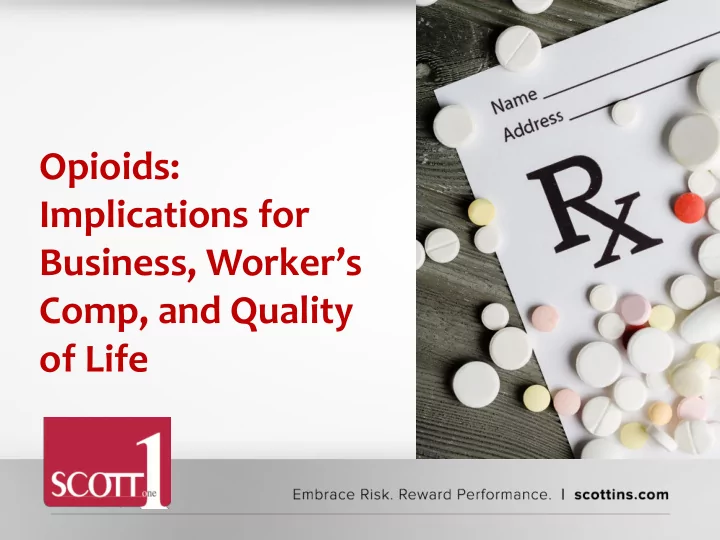

Opioids: Implications for Business, Worker’s Comp, and Quality of Life
Why? • Client Profile • Risk Performance Group • It’s Personal
What Kid Doesn’t Like to Blow Things Up?
What Are Opioids? Opioids are a class of prescription narcotic medication derived from the same plant as heroin
Where We Are
Where We Are 477 Number of pills per adult and child distributed by one Pharma company in Floyd County KY-18.4M doses in total(Business Insurance Article 1/11/2018) 5 Million prescriptions of Opioids written in Virginia during 2015 and 2016(Roanoke Times Article 1/26/18) 72% Percentage of Whites with Opioid Use Disorder, 57% of which were male(National Survey on Drug Use and Health 2016)
Where We Are 100 Million individuals affected by chronic pain Million Opioid prescriptions written in 2012 – enough to give every 259 American adult their own bottle of pills 3X Prescriptions compared to 20 years ago & expected to increase 5% US has < 5% of world’s population but consumes 80% of the Opioid supply Long-term use can lead to addiction & job impairment and is a growing problem for employers * National Institutes of Health & CDC stats
Increase driven by Opioid overdoses
Entry Point for Opioids • Common pain management events: • Teenager gets wisdom teeth removed • Athlete has knee surgery • Back surgery • Emergency Room visit – variety of causes • Workplace injury • Opioid prescribed for short term pain management
How We Got Here
How We Got Here • Unsubstantiated Claims - 600 Articles reference 1980 NEJM article • Rogue Pharmacies and Unethical Prescribing - Distributors don’t ask questions(McKesson suit) • Poor Patient and Provider Education -One Pharma company sponsored 20,000 education events for Dr.s claiming addiction potential was low • Health Insurance/Medicare Reimbursement -Reimbursement metrics based, in part, on patient satisfaction
How We Got Here • Doctors Caught in the Middle -Failing to provide adequate pain relief can be grounds for malpractice claims -71% of Emergency Room Dr’s surveyed reported a perceived pressure to prescribe Opioids to avoid regulatory and administrative criticism • Lack of FDA Oversight -FDA accepted Pharma Industry’s claim that Opioids’ addiction rate was low for too long
Relevant to Your Company? • Post-Workers Comp Injury • When Opioids prescribed in job related injuries, claims were almost 4x as likely to have a cost over $100,000 compared to claims without an Opioid prescription • Hopkins-Accident Research Fund Study in 2012 found that workers prescribed even one Opioid had average total claims costs 4-8X greater than claimants with similar claims who didn’t get Opioids
Relevant to Your Company? • Injured workers who take Opioids longer than 12 weeks usually don’t return to work at all due to dependence and other side effects Some Evidence of Opioid Use Causing WC Claims: • Client Survey of 700 drivers for Transportation Company: -147 drivers had a RX for a CNS Agent. 45% of these drivers went on to have a WC Claim. - 553 drivers did not have a RX and only 2% of this population went on to have a WC Claim
What Can Employers Do?
What Can Employers Do? Step 1: • Develop clearly-written drug-free workplace and drug testing policies to include disciplinary process (Include pre-hire, random, reasonable suspicion, post-accident testing) Step 2: • Specifically request that Opioids be tested for on your drug panel(may have to request specific drugs) Step 3: • Find out if you’re capturing both synthetic and semi - synthetic Opioids (Consult testing facility, panel physician, MRO)
What Can Employers Do? Step 4: • Develop and deepen relationship with Panel Physicians where possible. • Tour sites, ask if they use PDMPs, share Job Desc’s . Step 5: • Train employees on effects, issues, alternatives etc. • Re-frame as Safety issue - Opioid use and the impact on driving, using heavy equipment or Safety sensitive positions
What Can Employers Do? Step 5 Cont’d: • Remind Employees they can ask for alternative treatment • Use of EAP if available Step 6: • Consider use of Post Offer Medical Questionnaire • “Knowing What You are Getting”
Post Offer Medical Questionnaire Pre-Offer : Employer may not ask any disability-related questions or require any medical examinations, even if they are job related Post Offer/Pre Work: Employers may ask medical/disability related questions and conduct medical examinations, as long as you do so for all entering employees in the same job category • Information offered by Scott Insurance does not constitute legal advice. This review is provided for your information only, and should not be relied upon by third parties.
POMQ Continued • Implement with advice from HR and Legal Advisor: • Provide accurate job description to applicant • Obtain written confirmation that the person has no physical limitations that would prevent them from performing essential functions of job • Require completion of Post-offer Medical Questionnaire (POMQ) a.k.a Conditional Job Offer Form and send for physical examination • Information offered by Scott Insurance does not constitute legal advice. This review is provided for your information only, and should not be relied upon by third parties.
What should I do today? • Medicine Cabinet • Call your designated Physician • Drugs being captured • Concerns • Learn their preferences
Questions?
Recommend
More recommend